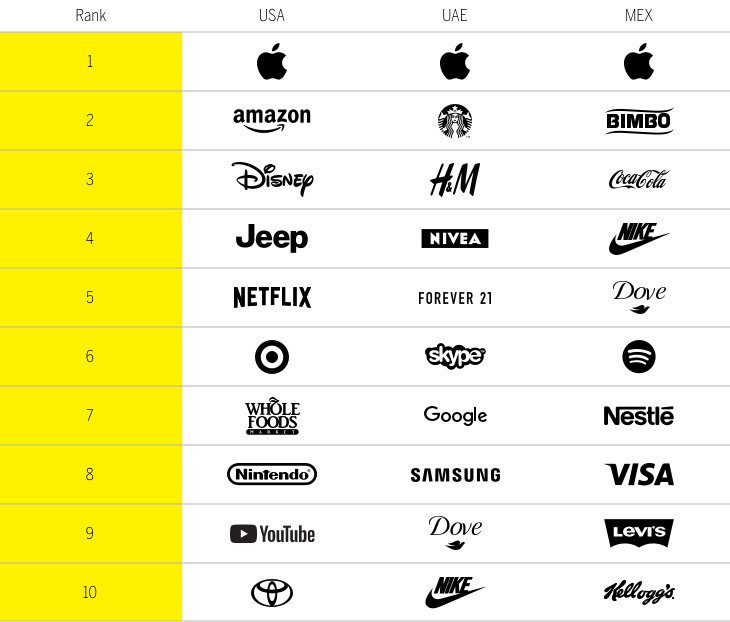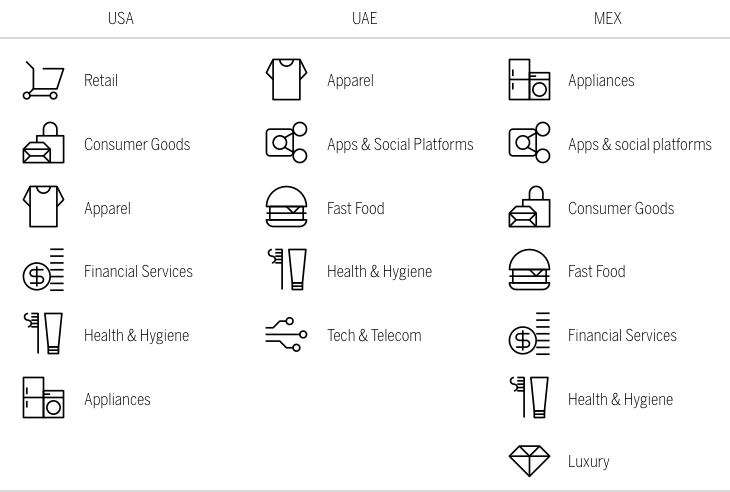Overview
- Using data from our 2018 Brand Intimacy Study, we compared how women in the U.S., Mexico and the UAE form emotional bonds with their top brands
- On average, women in the UAE are the most intimate with the brands they use, with 36 percent of women experiencing intimacy
- In all three markets, the Brand Intimacy archetypes of indulgence and ritual are stronger among women than they are among men
- While there are some interesting similarities between the three markets, our findings suggest that the ways people connect with brands are often determined by factors other than gender
In our 2016 and 2017 articles about women and Brand Intimacy, we’ve spoken about the similarities between how women and men form emotional attachments with the brands they use and how, overall, intimate brand relationships are very similar for women and men. This continues to be true in 2018.
In this article, we’re taking a different approach. Given the cultural conceptions about women as consumers and how to market to them, we decided to compare how women form intimate bonds across the three markets of our study: the U.S., Mexico, and the UAE. Some interesting parallels and distinctions emerged.
A diverse and distinct range of intimate brands among women
If we compare the top ten brands for women from our three markets, we can see a range of brands with a few similarities. Interestingly, the U.S.’s list is more homogenous in terms of industry, with only four industries (of fifteen) represented in the top ten (technology & telecommunications, retail, media & entertainment, and automotive). Mexico and the UAE, on the other hand, have a greater range represented, with seven and six industries, respectively. Mexico’s top five brands are especially heterogenous, representing five industries in five brands. Another key difference between the U.S. and the other countries is that there are four media & entertainment brands in the U.S.’s top ten (Disney, Netflix, Nintendo, and YouTube) and none in Mexico’s or the UAE’s. The success of these media & entertainment brands among U.S. women might help explain why the industry is ranks so much higher in the U.S. than it does in Mexico or the UAE.
Top ten most intimate brands by country

What’s most apparent in seeing each country’s top ten list side by side is Apple’s dominance. Apple is the top brand for women in all three countries (it’s also the top brand overall in all three). This ability to connect with women across the world is especially impressive given the lack of other brands that are able to do the same. Nike and Dove make the top ten in Mexico and the UAE, but otherwise these lists don’t share many brands—itself an interesting observation since many of the top brands are global. The variety of top brands across countries suggests women have a broad capacity to have intimate brand relationships. Trying to simplify or pigeonhole which brands perform best across markets may not be effective or reflect today’s reality.
Stronger bonds in certain countries
Overall, the UAE leads in terms of women experiencing intimacy, with 36 percent of women experiencing intimacy, followed by Mexico with 34 percent and the U.S. with 23 percent. The levels of intimacy are also highest in the UAE, as indicated by the country’s average Brand Intimacy Quotient, which scores overall performance on a scale from 1 to 100. The UAE’s average Brand Intimacy Quotient among women is 35.9, which is higher than Mexico’s score of 30.9 and the U.S.’s 27.4, indicating that UAE women have the strongest relationships with the brands they use.
Average Brand Intimacy Quotient for women in each country

The UAE is the only country in which women have a higher average Brand Intimacy Quotient than men, but in all three countries, the percentage of women experiencing intimacy is higher than that of men.
The power of indulgence and ritual
The Brand Intimacy archetypes are six patterns or markers that identify the character and nature of ultimate brand relationships. A significant similarity emerges in terms of archetypes. In all three of our markets, indulgence (centered on moments of pampering and gratification) and ritual (being ingrained into daily actions, becoming a vital part of daily existence) are stronger among women than among men. While women in the UAE have stronger associations with all archetypes, in the U.S. and Mexico these are the only two archetypes for which women average higher scores than men. The fact that women outscore men in these archetypes across the U.S., Mexico, and the UAE suggests that indulgence and ritual may be important mechanisms to leverage when building bonds with women and that these markers are relevant and effective across three very different marketplaces.
Brand Intimacy archetypes for women in each country

However, the associations consumers build with a single brand can vary. For example, Netflix, which is an intimate brand among women in all three countries, has a different Brand Intimacy profile for each nation.
Netflix’s archetype performance with women in each country

Women in the U.S. most associate the brand with the ritual archetype, whereas women in Mexico associate it with indulgence and those in the UAE with enhancement (not surprising given UAE women’s tendency to be intimate with brands that keep them connected, such as Apple, Skype, and Google). While all these associations play into each consumer’s relationship with Netflix, it’s interesting to see how the same brand can be loved by so many for a range of characteristics. Netflix is an interesting example of a how a brand can successfully build bonds with women in different ways.
Intimacy with some of the same industries
Our study shows that women form stronger bonds in certain industries than men. For example, women are more intimate with health & hygiene brands in all three countries. Many industries, such as apparel, appliances, apps & social platforms, consumer goods, fast food, and financial services, are more intimate with women in two out of three countries.
Industries that are more intimate with women by country

While some industries are common among the three countries, the greater intimacy among women in technology & telecommunications in the UAE and in financial services in Mexico and the U.S., indicates that women have the capacity to bond with brands across a breadth of industries.
Conclusion
The most notable similarity our Brand Intimacy review found is that in all three markets, women have stronger associations than men do with the ritual and indulgence archetypes. This similarity may indicate that these archetypes are particularly successful at forging emotional connections with women and could be an interesting starting point for any brand looking to deepen bonds with women.
There is also quite a bit of variation and diversity in the findings. Women in the U.S., Mexico, and the UAE form different kinds of emotional bonds with different brands (and even the same brands, as in the case of Netflix). These findings suggest that while it can be tempting for marketers to think of women as a group with common traits, preferences, or attitudes, the ways people create connections with brands are often determined by factors other than gender. These variations in Brand Intimacy among women in different countries challenge the notion that women consumers care only about certain industries, brands, or ideas. For a brand to be successful among women (as well as men), it must build relationships based on emotions—emotions that are not necessarily “feminine” and that may well vary from market to market.
Read our detailed methodology here.
